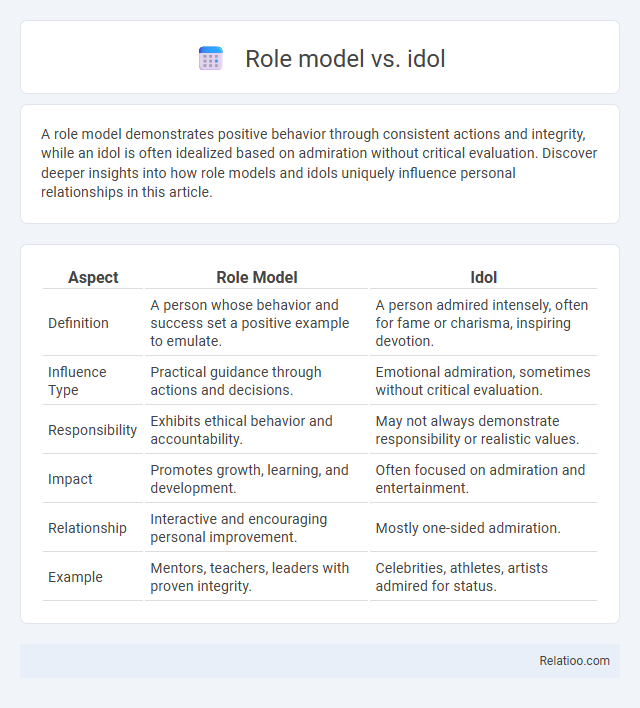A role model demonstrates positive behavior through consistent actions and integrity, while an idol is often idealized based on admiration without critical evaluation. Discover deeper insights into how role models and idols uniquely influence personal relationships in this article.
Table of Comparison
| Aspect | Role Model | Idol |
|---|---|---|
| Definition | A person whose behavior and success set a positive example to emulate. | A person admired intensely, often for fame or charisma, inspiring devotion. |
| Influence Type | Practical guidance through actions and decisions. | Emotional admiration, sometimes without critical evaluation. |
| Responsibility | Exhibits ethical behavior and accountability. | May not always demonstrate responsibility or realistic values. |
| Impact | Promotes growth, learning, and development. | Often focused on admiration and entertainment. |
| Relationship | Interactive and encouraging personal improvement. | Mostly one-sided admiration. |
| Example | Mentors, teachers, leaders with proven integrity. | Celebrities, athletes, artists admired for status. |
Understanding the Concepts: Role Model vs Idol
A role model exemplifies behaviors and values that others aspire to emulate, often demonstrating integrity, hard work, and resilience, while an idol is typically admired for fame, appearance, or talent without deeper personal identification. Understanding the concepts highlights that role models influence long-term personal growth by setting practical examples, whereas idols may inspire admiration but lack substantive guidance for behavior. Differentiating between role models and idols helps individuals seek meaningful influences that contribute positively to their development.
Key Differences Between Role Models and Idols
Role models inspire by demonstrating admirable behaviors and values that people can realistically emulate, emphasizing personal growth and ethical conduct. Idols are often admired for their fame, talent, or image, creating an aspirational but sometimes superficial influence based on admiration rather than practical example. Understanding the key difference lies in the depth of impact: role models provide actionable guidance for personal development, while idols primarily offer admiration and entertainment.
Psychological Impact of Role Models and Idols
Role models influence behavior by providing attainable examples that promote positive psychological development, fostering self-efficacy and motivation. Idols often represent idealized figures that may lead to unrealistic expectations or identity confusion due to their sometimes unattainable qualities. The psychological impact of role models tends to nurture personal growth and resilience, whereas idolization can result in dependency or diminished self-esteem if individuals compare themselves unfavorably.
Influence on Personal Development
Role models shape your personal development by demonstrating behaviors and values that you can emulate, fostering growth through positive examples. Idols often inspire admiration and motivation but may not provide practical guidance for self-improvement. Understanding the distinction allows you to choose influences that actively contribute to your character and life skills.
Cultural Perspectives on Role Models and Idols
Cultural perspectives shape the distinction between role models and idols, influencing how individuals perceive and emulate these figures. In many societies, role models are admired for their ethical behavior, achievements, and positive contributions, guiding Your personal development and values. Idols, often entrenched in popular culture, may be celebrated for fame or charisma but do not always embody the principles needed for long-term personal growth.
Media’s Role in Shaping Idols and Role Models
Media plays a crucial role in shaping public perceptions of idols and role models by amplifying their visibility and framing their narratives to highlight desirable traits or behaviors. Idols often emerge through media exposure, emphasizing celebrity status and aspirational lifestyles, while role models are portrayed by focusing on achievements, integrity, and positive social impact. The media's selective representation significantly influences how audiences differentiate between mere admiration for idols and the deeper respect and emulation inspired by role models.
Choosing Your Inspiration: Criteria and Consequences
Choosing your inspiration involves distinguishing between a role model, who exemplifies desired behaviors and values through consistent actions and ethical integrity, and an idol, often admired for fame or superficial qualities without necessarily embodying reliable traits. Evaluating criteria such as personal growth potential, authenticity, and long-term influence is crucial in selecting a figure who positively shapes your mindset and goals. Consequences of this choice impact motivation, decision-making patterns, and resilience, highlighting the importance of consciously aligning your inspiration with constructive and realistic standards.
The Pros and Cons of Idolizing Celebrities
Idolizing celebrities offers inspiration and motivation by showcasing success and talent but risks unrealistic expectations and dependency on public personas often shaped by media. Unlike idols, role models provide relatable behavior and values, promoting personal growth through attainable examples. Overemphasis on celebrity idolization can lead to neglecting genuine role models who foster critical thinking and self-improvement.
How to Become a Positive Role Model
Becoming a positive role model requires consistent actions that embody integrity, empathy, and resilience, setting an example others can genuinely admire and learn from. Unlike idols, who are often idealized from a distance, your influence as a role model is defined by your tangible behaviors and willingness to mentor and support others in their growth. Focusing on authentic communication, accountability, and encouraging positive values helps you inspire lasting change and fosters trust within your community.
Role Models and Idols in the Digital Age
Role models inspire through their actions, values, and achievements, offering tangible examples for personal growth, while idols often represent idealized figures admired for fame or charisma, sometimes lacking relatable qualities. In the digital age, social media amplifies both role models and idols, blurring the lines as followers engage with curated content that may emphasize image over substance. Your ability to discern genuine role models from superficial idols shapes the impact these figures have on your aspirations and self-perception.

Infographic: Role model vs Idol
 relatioo.com
relatioo.com